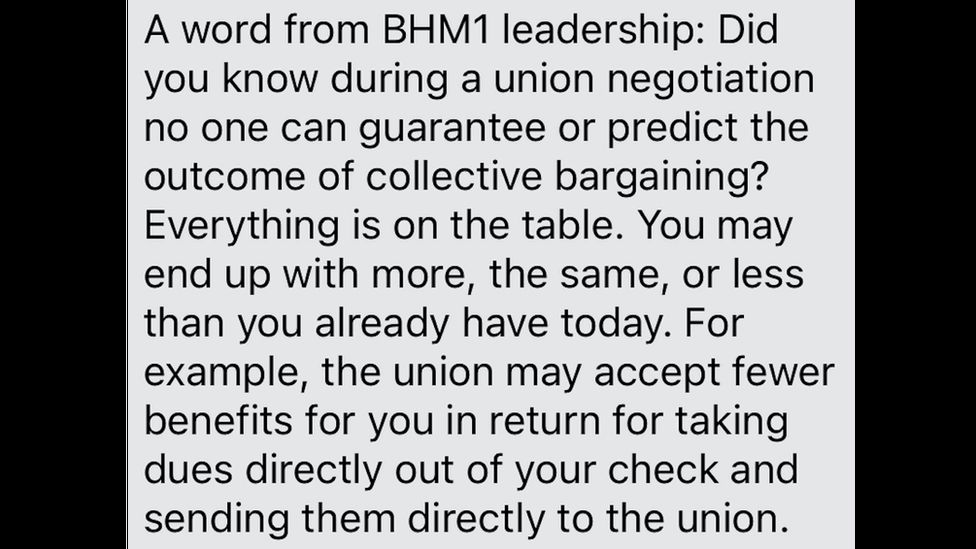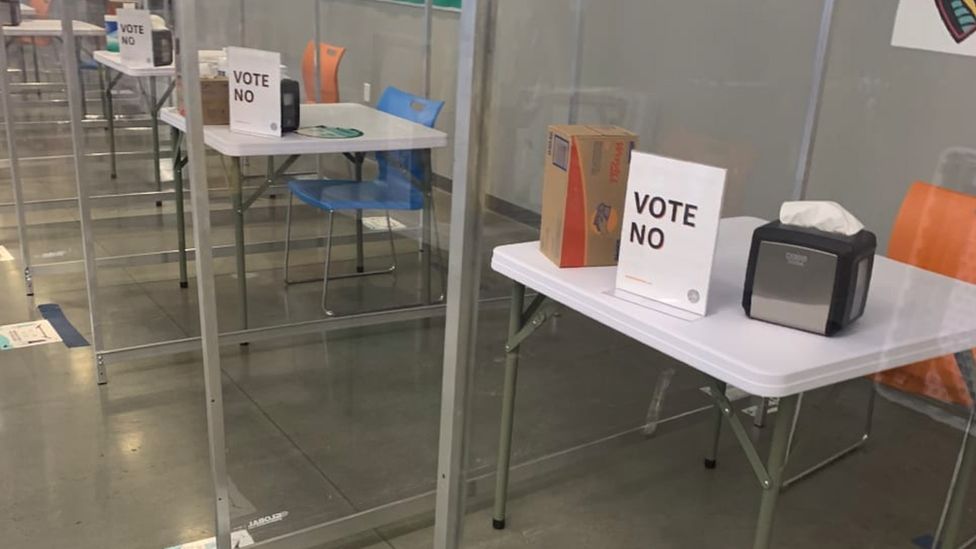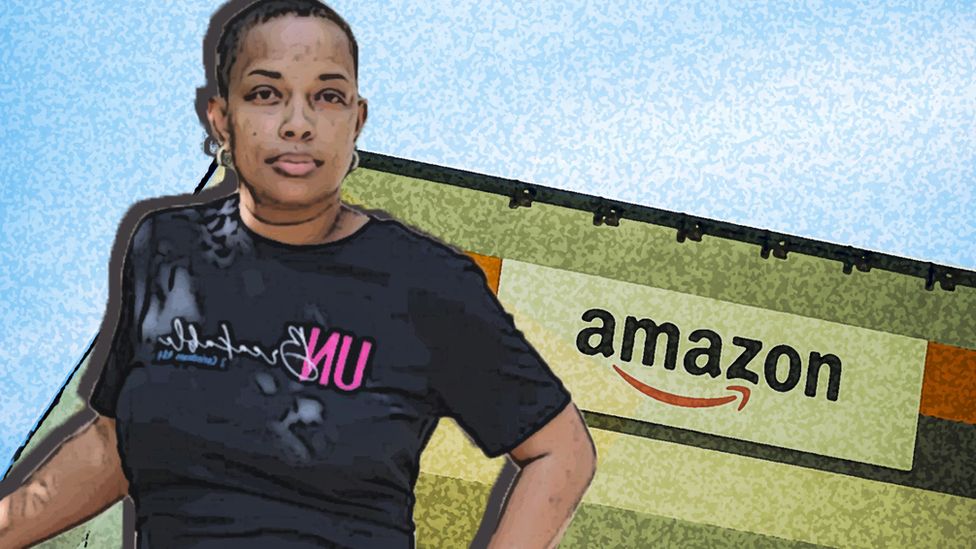Amazon: How one cancer patient’s story helps explain the Alabama union vote
On 12 July, she walked up to a manager at an Amazon warehouse in Bessemer, Alabama, and said she felt unwell.
Shortly afterwards, she had a seizure on the floor. She was rushed to hospital and diagnosed with brain cancer.
She’s exactly the type of person you might expect to have supported a recent vote to create the first trade union of Amazon workers, in order to safeguard her job post-surgery.
But despite having been in a union in her previous career, she was one of a majority of employees – two-to-one, in fact – to vote the proposal down.
“Amazon has been a godsend for me,” she says.
Carla was a teacher for 14 years in Birmingham, Alabama. She taught 12 and 13-year-old children science.

In 2019 she decided to work for a contractor – preparing students for exams. Then the pandemic hit. With pupils no longer in school, the work dried up.
She looked around for other jobs and found a company that was actually hiring – Amazon. Her first shift was in May.
“I first started out packing. Depending on the item, I would pack it in the box, give it an address and put it on a conveyor belt to be shipped out to the customers. It wasn’t anything that was hard.”
Then one Sunday in July her world fell apart. After her seizure, she remembers telling the paramedics to ring her mum, but little else.
She had surgery to remove a brain tumour, and chemotherapy. Her treatment has cost around $170,000 (£123,000) so far. She says she would never have been able to pay without insurance.

To understand labour relations in the US is impossible without looking at healthcare.
A job isn’t just a pay cheque, it’s a ticket to a longer, healthier life – for workers and their families.
Crucial then to Amazon’s strategy to win a union vote was its healthcare plan for workers. “Starting pay of at least $15 per hour and comprehensive healthcare from day one” was the oft-said message.
Amazon’s tactics had a darker side though. The union wanted to talk about excessive workload, bathroom breaks and pay. Amazon pushed the narrative that the union might take away worker benefits, including healthcare.
Workers were bombarded with messages, including texts, which claimed workers’ benefits might be bargained away by the union.

“You may end up with more, the same, or less” is the message from a union info-website set up by Amazon.
In practice, it would be highly unusual for a union to negotiate away existing perks – and of course it would be Amazon taking away the benefits.
“The only way that happens is if the employer decides to take them away. The union’s not going to argue: ‘Let’s cut benefits for the workers'” says Stuart Appelbaum, head of the Retail, Wholesale and Department Store Union that is pushing for Amazon workers to unionise.
Mr Appelbaum is angry. He believes Amazon played dirty – that the messaging given to Amazon workers at “union education meetings” for example, known by the union as “captive audience meetings”, was misinformation dressed up as fact.

The Amazon centre itself was cloaked in anti-union messaging – in the bathrooms, the break rooms and the entrance, for example.
Darryl Richardson voted for the union. But while trying to persuade others, he realised Amazon’s messaging was working: “They were scared that healthcare was going to be taken away. That’s why a lot of them voted “no” against the union. We got the outcome we have now because they threatened them, that benefits and wages were going to drop.”
Darryl himself had been laid off from his job in a car plant during the pandemic. He’s thankful for the job he has and doesn’t want to leave. But he believes Amazon’s characterisation of the union was inaccurate – particularly when it came to wages and healthcare.
Another area of controversy were union subs, or dues. Critics say that much of Amazon’s narrative was based around the idea that workers would have to pay the union money. However, Alabama is a Right To Work state. No worker has to pay subs. So did Amazon break the law in their messaging?
“It’s not clear” says Prof John Logan, a labour expert at San Francisco State University.
“They are very skilled in operating in the grey areas, that’s why they’re so effective. You know some of what they say is clearly legal. Other things are kind of pushing the boundaries of the law – and the weakness of the law.”
Amazon says: “It was important that all employees understood the facts of joining a union… If the union vote passed, it would impact everyone at the site and it’s important all associates understood what that meant for them”.
But whether the messaging was on the right side of the law or not, one thing was overlooked by many observers who thought the union could win.
The pandemic has caused unemployment which has disproportionately affected black communities.
Around 85% of the workers at Amazon’s warehouse in Bessemer are black.
And that means this was a workforce acutely sensitive to arguments around pay, benefits and the future of their jobs.
The union argues that Amazon’s tactics amount to “intimidation” of workers and are mounting a legal challenge. Amazon denies the allegations.
“Our employees heard far more anti-Amazon messages from the union, policymakers, and media outlets than they heard from us”, said a spokesperson.
Carla started working again at Amazon in November. “I felt the things the union were offering, I was already getting,” she says.
She spent her birthday having a spa day, and then watched her youngest son play baseball. She is now in remission, and firmly believes she wouldn’t be alive if she hadn’t been working for an employer with good healthcare. She may well be right.
And as for unions? Well, union membership has been falling since the 1980s. Only 6% of Americans working in the private sector are members of a union.
And unless unions can find a way of convincing people like Carla that they can make a positive impact on healthcare, benefits and wages, that’s not going to change.
James Clayton is the BBC’s North America technology reporter based in San Francisco. Follow him on Twitter @jamesclayton5.
Source: BBC.com
